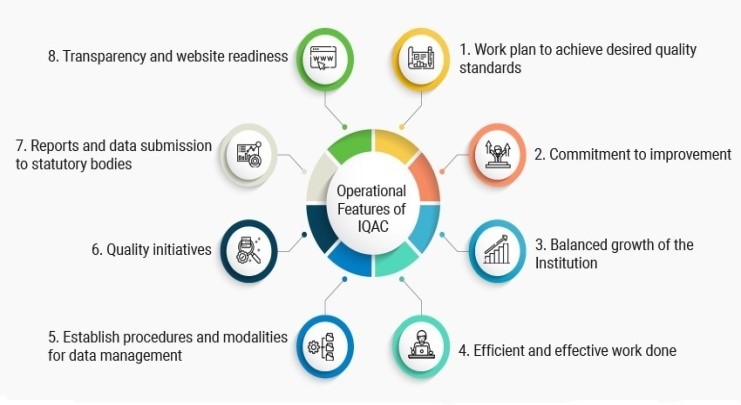About IQAC

Prof. (Dr.) Saumya Sengupta
Head of Department (History)
IQAC & NAAC Co-ordinator
About IQAC
In pursuance of the National Action Plan of the National Assessment and Accreditation Council (NAAC), Bangalore, for performance evaluation, assessment and accreditation and quality upgrading of institutions of higher education, NAAC proposes that every accredited institution should establish an Internal Quality Assurance Cell (IQAC) as a post-accreditation quality sustenance measure. Since quality enhancement is a continuous process, the IQAC will become a part of an institution’s system and work towards realizing the goals of quality enhancement and sustenance. The prime task of the IQAC is to develop a system for conscious, consistent and catalytic improvement in the performance of institutions. The IQAC will make a significant and meaningful contribution in the post-accreditation phase of institutions. During the post-accreditation period, the IQAC will channelize the efforts and measures of an institution towards academic excellence.
The guidelines provided in the following pages will facilitate the institution in the creation and operation of the Internal Quality Assurance Cell (IQAC). The work of the IQAC is the first step towards the internalization and institutionalization of quality enhancement. Its success depends upon the sense of belongings and participation it can inculcate in all the constituents of the institution. It will not be yet another hierarchical structure or record-keeping exercise in the institution; it will be a facilitative and participative voluntary system/unit/organ of the institution. The IQAC has the potential to become a vehicle for ushering in quality by working out intervention strategies to remove deficiencies and enhance quality. Quality circles in industries operate on similar lines.
Objectives of the Internal Quality Assurance Cell (IQAC)
The primary aim of IQAC is to develop a system for conscious, consistent and catalytic action to improve the academic and administrative performance of the institution. It also promotes measures for institutional functioning towards quality enhancement through internalization of quality culture and institutionalization of best practices.
IQAC Evolves Mechanisms and Procedures
Ensuring timely, efficient and progressive performance of academic, administrative and financial tasks. The relevance and quality of academic and research programmes.
- Equitable access to and affordability of academic programmes for various sections of society.
- Optimization and integration of modern methods of teaching and learning.
- The credibility of evaluation procedures
- Ensuring the adequacy, maintenance and functioning of the support structure and services
- Research sharing and networking with other institutions in India and abroad.
Functions of IQAC
Development and application of quality benchmarks/parameters for various academic and administrative activities of the institution Facilitating the creation of a learner-centric environment conducive to quality education and faculty maturation to adopt the required knowledge and technology for participatory teaching and learning process. Arrangement for feedback response from students, parents and other stakeholders on quality- related institutional processes. Organization of inter and intra-institutional workshops, seminars on quality related themes and promotion of quality circles.
Acting as a nodal agency of the Institution for coordinating quality-related activities.
- Development of Quality Culture in the institution
- Periodical conduct of Academic and Administrative Audit (AAA) and its follow-up.
- Preparation of the Annual Quality Assurance Report (AQAR) as per guidelines and parameters of NAAC, to be submitted to NAAC
Benefits of IQAC
IQAC WILL FACILITATE / CONTRIBUTE:
- To a higher level of clarity and focus in institutional functioning towards quality enhancement and facilitate internalization of the quality culture NAAC for Quality and Excellence in Higher Education
- To the enhancement and integration among the various activities of the institution and institutionalize many good practices
- To provide a sound basis for decision making to improve institutional functioning
- To act as a change agent in the institution
- To better the internal communication.
The Role of Coordinator / Director
The role of the coordinator of the IQAC is crucial in ensuring the effective functioning of all the members. The coordinator of the IQAC may be a senior person with expertise in quality aspects. She/he may be a full-time functionary or, to start with, she/he may be a senior academic /administrator entrusted with the IQAC as an additional responsibility. Secretarial assistance may be facilitated by the administration. It is preferable that the coordinator may have a sound knowledge about the computer, its various functions and usage for effective communication.

Quality assurance is a by-product of ongoing efforts to define the objectives of an institution, to have a work plan to achieve them and to specify the checks and balances to evaluate the degree to which each of the tasks is fulfilled. Hence, devotion and commitment to improvement rather than mere institutional control is the basis for devising procedures and instruments for assuring quality. The right balance between the health and growth of an institution needs to be struck. The IQAC has to ensure that whatever is done in the institution for “education” is done efficiently and effectively with high standards. In order to do this, the IQAC will have to first establish procedures and modalities to collect data and information on various aspects of institutional functioning.
The coordinator of the IQAC has a major role in implementing these functions. The IQAC may derive major support from the already existing units and mechanisms that contribute to the functions listed above. The operational features and functions discussed so far are broad-based to facilitate institutions towards academic excellence and institutions may adapt them to their specific needs.

